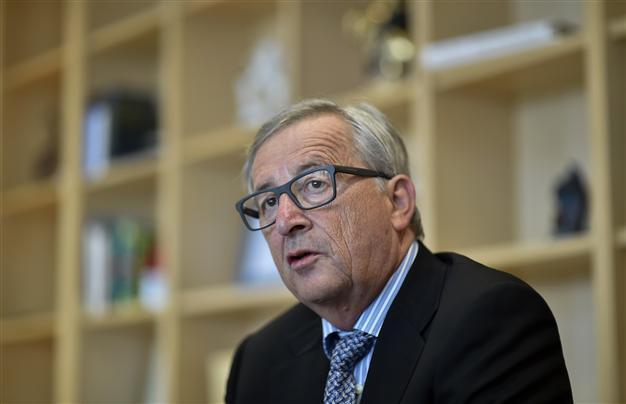Juncker says EU to aid refugees, tighten border controls
STRASBOURG - Reuters

AFP photo
European Commission President Jean-Claude Juncker said on Sept. 8 the EU executive would offer better protection for refugees but also improve its frontier defences and deport more illegal migrants.In a written annual statement of priorities ahead of his State of the Union address to the European Parliament, he told lawmakers and EU governments that he would offer "a swift, determined and comprehensive response to the refugee crisis".
Listing the problem first among a list of his priorities, before the economy, Ukraine, climate change and a looming vote on Britain's membership of the bloc, he said the crisis was caused by "war, terror and instability in our neighbourhood".
He confirmed plans to ask member states to agree to an "emergency relocation mechanism" to spread asylum-seekers now crowding in to Italy, Greece and Hungary; a permanent mechanism for the same in future crises; and a common list of "safe countries of origins" whose citizens would be subject to fast-track deportations if they breached EU immigration laws.
Juncker, whose proposals face opposition among governments whose interior ministers will meet on Monday, also pledged to improve the management of the bloc's external frontiers, bolster its Frontex border agency and take "steps toward the creation of European coastguard and border guard systems".
He also proposed a "more effective approach to return" - addressing complaints that too many people not entitled to asylum enter the Union illegally and then remain there, often despite legal proceedings that conclude they should return home.
Juncker called for efforts to strengthen the EU's common asylum system and a scheduled review of the so-called Dublin system, among whose rules is that people must claim asylum only in the state where they first enter the EU, straining resources in frontline countries in the south and east.
Answering criticism from refugee and migration agencies, he said the EU would "develop safe legal avenues for those in need of protection" - reducing the temptation to risk dangerous sea crossings and smuggling networks - as well as a permanent scheme to resettle refugees from other regions and better protection for refugees living in regions neighbouring Europe.
He also renewed a proposal to review the system by which workers can apply to migrate to the EU, addressing concerns on an ageing continent that it needs to attract new people.
His speech to the European Parliament in Strasbourg was due to start after 9 a.m. (0700 GMT).
The detailed proposals may provoke new wrangling among EU states and between national leaders and the EU executive.
However, the mounting scale of the human calamity on the bloc's frontiers -- and fears that discord might do wider damage to shared interests like freedom of travel across Europe's internal borders -- has kindled some willingness to compromise after an earlier Juncker plan in May provoked bitter recriminations.
Making his first annual State of the Union address, Juncker will propose states accept binding quotas to take in 160,000 asylum-seekers from frontline countries - four times the number he put forward in May to howls of outrage, notably in eastern Europe.
But a balance between humanitarian embrace and self-defence for a continent fearful of the millions suffering from war and want beyond its borders, has helped take some of the heat out of a debate among leaders, who rejected Juncker's original migrant quota idea as a counter-productive Brussels "diktat".
"This time, the Commission seems to be proposing a more comprehensive approach, also addressing the need to control the external frontiers better," said one EU diplomat whose government was among those in the east who argued that their society, unused to immigration, could not take in large numbers.
"There is still a lot to negotiate. There is a lot we cannot accept. But the debate is now a lot less emotional."
Also driving the EU towards some accord has been the stand taken by German Chancellor Angela Merkel, whose government has taken in the greatest number of asylum-seekers.
She has called on poorer eastern neighbours who receive German-funded EU subsidies to show solidarity -- and warned that the Schengen system of open borders from which they benefit is under threat from chaotic movements of migrants across the bloc.
"When Merkel needs something, and she plays it sensibly as she usually does, things start to move," said another senior EU diplomat from the formerly Communist east.
While Hungarian Prime Minister Viktor Orban remains vocally opposed to relocation quotas, his country will now benefit from the scheme, having taken in tens of thousands. And Polish Prime Minister Ewa Kopacz conceded on Tuesday that Warsaw could take in more than the 2,000 people it has said. Under Juncker's plan, EU sources say Poland would be asked to take in nearly 12,000.
EU officials have said countries could also be offered the chance to contribute financially rather than take in migrants.
Britain has been critical of the EU approach but is exempt from the bloc's asylum policies and will not take part, although Prime Minister David Cameron said this week it would accept up to 20,000 Syrian refugees over five years. Spain, which had complained its likely quota was too high, said on Tuesday it was ready to take what the European Union allocated to it.
















